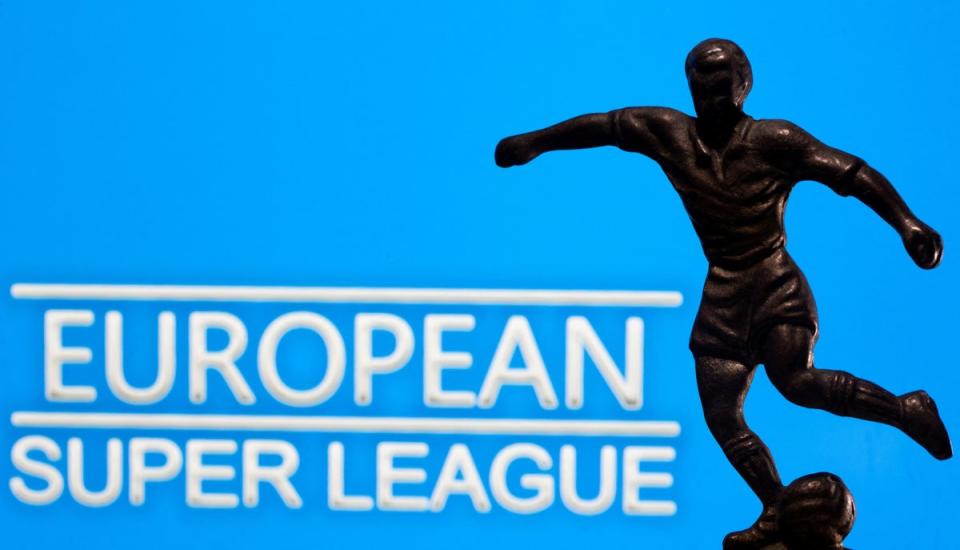European Super League launches radical new plan for football
The European Super League (ESL) have launched a radical new plan to overhaul football after a landmark court ruling determined that Uefa had violated EU competition law by forbidding the project initially.
The European Court of Justice ruled that football’s governing bodies acted “unlawfully” by blocking the breakaway league – stating that Fifa and Uefa abused their dominant position by forbidding clubs outright to compete in the ESL, although added that the Super League may still not be approved.
Sports development company A22, formed to assist in the creation of the ESL, celebrated the ruling and heralded a new dawn for the sport.
“We have won the right to compete. The Uefa monopoly is over. Football is free,” said A22 CEO Bernd Reichart. “Clubs are now free from the threat of sanction and free to determine their own futures.”
In addition to the Uefa ban, the Super League’s initial plans that were launched in April 2021 went down in flames due to huge backlash from fans – specifically surrounding the breakaway tournament being a ‘closed shop’ protecting big teams with no promotion or relegation and no indication of a women’s competition.
Following the ECJ ruling, the Super League has now relaunched with a new format – proposing men’s and women’s midweek European competitions with promotion and relegation included and all Super League matches being free to watch.
“The Court of Justice of the European Union today announced its ruling in the case regarding the anti-competitive practices of Uefa – ending its 69-year monopoly in cross-border club football in Europe,” said A22. “This clears the path for clubs to organise and manage pan-European football competitions.
“Following today’s landmark ruling, A22 announces a new proposal for men’s and women’s midweek European competitions with participation based on sporting merit with promotion/relegation and no permanent members.
“The proposal also includes innovative plans to launch the world’s leading direct-to-fan sports streaming platform, where billions of fans would be able to watch live all Super League matches for free.”

Format of the new European Super League
Further details of the proposed new format revealed that the men’s structure would see 64 clubs split into a three-tier league system, with 16 clubs in the ‘Star League’ top tier, 16 clubs in the ‘Gold League’ second tier and 32 clubs in the ‘Blue League’ third tier – with the names derived from the components of the European Union flag.
Clubs will play home and away matches in groups of eight, guaranteeing at least 14 matches per team each season, with a knockout competition for the top eight sides then determining the league winners.
There will be promotion and relegation between the leagues, with promotion to the third-tier ‘Blue League’ determined by domestic league performance.
The women’s competition will see 32 clubs split into a top-tier ‘Star League’ of 16 teams and a second-tier ‘Gold League’ of 16 teams. Just as in the men’s competition, clubs will play in groups of eight – home and away – with a guaranteed minimum of 14 matches per year and at the end of the season, a knockout stage of eight clubs will be played in each league to determine the champions.
There will be annual promotion and relegation between the two leagues and promotion into the Gold League will be based on domestic league performance.

Will Premier League clubs join the European Super League?
However, even if a revised European Super League does get the green light, it appears as if Premier League clubs will still be unable to join. The UK is no longer bound by EU law since Brexit and the UK government’s Department of Culture, Media & Sport released a statement that indicated a bill about to pass into law, which sets up a new independent football regulator, would stop English clubs joining.
"The attempt to create a breakaway competition was a defining moment in English football and was universally condemned by fans, clubs and the Government,” said a DCMS spokesperson.
"We took decisive action at the time by triggering the fan-led review of football governance, which called for the creation of a new independent regulator for English football. We will shortly be bringing forward legislation that makes this a reality, and will stop clubs from joining any similar breakaway competitions in the future."

 Yahoo Sport
Yahoo Sport 



































































